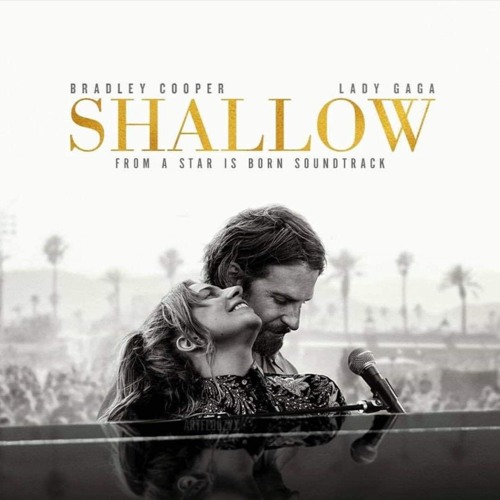

It was a great decision for the movie to use live, on-set performances rather than studio takes of the songs, so that they feel grounded in the situation. Unfortunately the version of “La Vie en Rose” we hear on the soundtrack isn’t as affecting as it is on screen, precisely because it’s the same one. But Gaga’s own recent career testifies to the fact that she’s been struggling with both sides of the equation, stepping back from her earlier Artpop concept to sing standards with Tony Bennett and sing autobiographical country rock on her most recent album Joanne that often, in retrospect, seems to presage the pop-ballad hybrid style she works to her best effect in some of A Star Is Born. This is where James Mason’s Norman Maine is first captivated by her voice, just as Cooper’s Jackson Maine is taken with Gaga at the drag bar-the crucial difference being that while Garland is in private and so letting her “true” self out, Jack is witnessing Ally almost playing herself as a drag queen, the layers of gender performance (and false eyebrows) testifying to a grander, less rigid idea of truth. The performance she gives there of Edith Piaf’s “La Vie en Rose” is the film’s first musical highlight and one of the most memorable, standing exactly in the place of Judy Garland’s historic rendition of Ira Gershwin and Harold Arlen’s “ The Man That Got Away” in the 1954 film, which takes place in an after-hours bar where her jazz band has gone to jam after their paying gig.

The fact that we first meet her in a drag bar, the only woman welcomed (even allowed) on the bill by the queens of the place, underlines that message immediately. Of course, just asking Lady Gaga herself to play the Streisand part determines this, since her whole persona was built on blurring distinctions between the supposedly fake and real-drawing on Andy Warhol, David Bowie, Madonna, and many more to argue that one’s truest self can be found in being someone else. “Always Remember Us This Way” is the song Gaga was searching for on Joanne. What emerges in the best musical moments of the movie and the soundtrack is actually a synthesis, where every part of the person, including pretenses and sincerity, stagecraft and self-revelation, is mobilized to unleash every possible register of emotion. What’s more, Sam Elliott as Cooper’s older brother, in a later scene, counters with an idea about music and interpretation that feels deeper than any of that folderol. This gives the lie to the endless bad dialogue in the movie where Cooper insists that writing her own songs, what Ally “has to say,” is the only value that counts. On the soundtrack, most of Cooper’s meant-to-be-good country rock is actually duller and dumber than Gaga’s most exaggerated, meant-to-be-bad pop “ sellout” tracks, like “Why Did You Do That?” and “Hair Body Face” (both credited partly to one of Gaga’s primary partners in her own poppiest phase, DJ White Shadow). Imagine the effect on his persona of a big black coif and red-and-white vintage garb, a little more downtown in his frown.Īll these factors help balance out the conceptual flaw that several observers have noted in the movie, which is that it tends to subscribe to an outdated and always misbegotten idea of musical authenticity that treats songwriting as superior to performance, pleasure as less worthy than misery, and implicitly, femininity as more artificial than masculinity. Instead of Kristofferson, it might have felt more contemporary if Cooper could have chosen, for instance, a fading indie-rock phenomenon to model himself on here, for instance Jack White.

So he’d be an unlikely contact point between the chart-pop world and Gaga’s gifted but previously luckless singer Ally. He would be a Nashville star, or more of a cult Americana artist, not the rock idol appearing at Coachella that he’s made out to be. In the film, it’s easy enough to overlook the fact that Cooper’s Jackson Maine character-more or less a repeat (or, as one critic friend put it, a “cover version”) of Kris Kristofferson’s country-rocker character from the 1976 A Star Is Born with Barbra Streisand-makes very little sense as a figure in the 2018 music world, even one with his best days a bit behind him. Most of Cooper’s meant-to-be-good country rock is actually duller and dumber than Gaga’s most exaggerated, meant-to-be-bad pop “sellout” tracks.


 0 kommentar(er)
0 kommentar(er)
